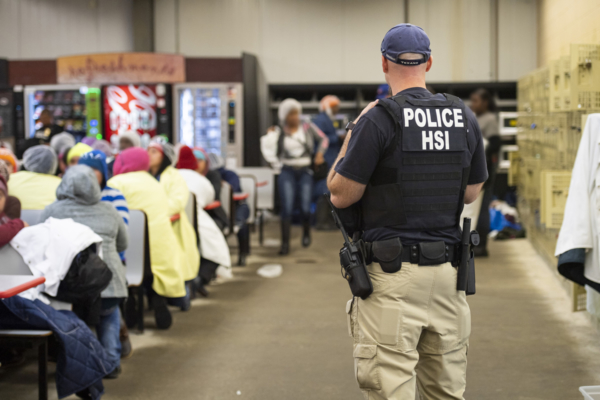Episcopal diocese joins Mississippi churches offering support for families affected by raidsPosted Aug 9, 2019 |
|

Federal authorities conduct a U.S. Immigration and Customs Enforcement worksite enforcement operation in Canton, Mississippi, on Aug. 7. Photo: Immigration and Customs Enforcement
[Episcopal News Service] The Diocese of Mississippi is mobilizing Episcopalians in the state to assist families affected by federal immigration raids this week as Bishop Brian Seage joined other religious leaders in condemning the raids, in which nearly 700 workers were taken into custody at seven Mississippi chicken processing plants.
A joint statement signed by Seage and four Catholic, Methodist and Lutheran bishops in Mississippi called on the Trump administration to end immigration enforcement tactics that they say are spreading fear in local communities and threatening to cause “unacceptable suffering” for families and children.
“Within any [political] disagreement we should all be held together by our baptismal promises,” the bishops said. As followers of Christ, “we are his body and, therefore, called to act in love as a unified community for our churches, and for the common good of our local communities and nation. … Of course, we are committed to a just and compassionate reform to our nation’s immigration system, but there is an urgent and critical need at this time to avoid a worsening crisis.”
Seage also spoke briefly at an immigrant rights rally Aug. 8 in Jackson and issued a written statement that raised specific concerns about the effects of the raids on families living in Mississippi.
“We don’t know how many children have been affected at this time, but I am asking for churches and individuals willing to help with caring for the children to contact local officials,” Seage said in his online statement. “Likewise, we are exploring avenues through which support, financial and otherwise, may be extended.”
Agents from U.S. Immigration and Customs Enforcement targeted several plants in central Mississippi on Aug. 7 that were suspected of employing workers who lacked proper immigration documentation. The raids were said to be the largest conducted so far under President Donald Trump, whose hardline approach to immigration has been a cornerstone of his campaign and presidency.
The Department of Justice announced the day after the raids that 300 of those detained already had been released.
“That’s not enough,” Seage said at the rally in Jackson (starting at about the 36:00 mark here). “And it won’t be enough until all those families are reunited – and likewise, [until] others who dare to have the American dream and dare to go to work can go to work and not worry whether or not they will be coming home at night.”
Seage told the crowd he was horrified by the news of the raids. “Horrified to imagine children being separated from their parents,” he said. “And children coming home to an empty house.”
Federal authorities said they took precautions so children were not left without a parent’s care due to the raids. A Justice Department statement said those detained “were asked when they arrived at the processing center whether they had any children who were at school or child care and needed to be picked up,” and cellphones were provided to help them make arrangements for child care as needed, according to the Justice Department. The department said some parents were released to ensure “all children were with at least one of the parents.”
But some of the families were “traumatized,” Bishop Joseph Kopacz of the Roman Catholic Diocese of Jackson told the Jesuit magazine America. His diocese’s Catholic Charities is among the agencies reaching out to those families now to offer assistance.
“This is a man-made disaster,” Kopacz said, noting also that the raids happened on the first day of school in these communities. “These folks are our neighbors. They’re not criminals, the vast majority of them. They’re hardworking people.”
Family separations under the Trump administration’s “zero tolerance” immigration policies sparked intense controversy last year, prompting federal officials to back down from those measures, though conditions at detention facilities on the southern border remain a contentious issue.
The Episcopal Church, at its General Convention in July 2018, passed a resolution decrying and urging a halt to “the implementation and intensification of inhumane and unjust immigration policies and practices such as detaining and separating children from parents.” It was adopted after more than 1,000 bishops, deputies and other Episcopalians participated in a prayer vigil held outside an immigrant detention facility near the convention center in Austin, Texas.
Another resolution approved last year affirmed the church’s support for “respecting the dignity of immigrants” through immigration policies and reforms.
More recently, church leaders expressed alarm in June when the Trump administration threatened a large-scale roundup of immigrants facing deportation orders in 10 cities. Those threats mostly fizzled.
“We are called as people of faith to strive for justice and peace among all people and respect the dignity of every human being,” Seage said at the Aug. 8 rally in Jackson.
Seage, in his follow-up statement, asked members of his diocese to contact the Mississippi Department of Child Protection Services if they know of a child affected by the raid who is in need of care. That agency put out its own statement saying it was ready to assist children whose parents were detained.
Federal authorities did not alert the state to any child care needs, but the state agency began preparing an emergency response after learning about the raids through local news reports.
“We have foster homes that have been carefully inspected and licensed, and foster caregivers who have been well trained and have passed criminal background checks,” Child Protection Services spokeswoman Lea Anne Brandon said in a news release. “We know we can provide safe and secure placements and trauma-informed temporary care for these children – but we have not been asked to do so.”
– David Paulsen is an editor and reporter for Episcopal News Service. He can be reached at dpaulsen@episcopalchurch.org.

Social Menu